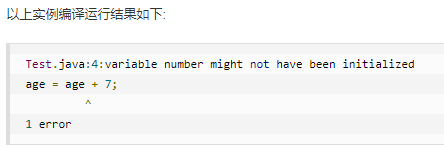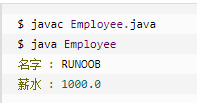public class Variable{ static int allClicks=0; // 类变量 String str="hello world"; // 实例变量 public void method(){ int i =0; // 局部变量 } }
public class Test{ public void pupAge(){ int age = 0; age = age + 7; System.out.println("小狗的年龄是: " + age); } public static void main(String[] args){ Test test = new Test(); test.pupAge(); } }
public class Test{ public void pupAge(){ int age; age = age + 7; System.out.println("小狗的年龄是 : " + age); } public static void main(String[] args){ Test test = new Test(); test.pupAge(); } }

import java.io.*; public class Employee{ // 这个实例变量对子类可见 public String name; // 私有变量,仅在该类可见 private double salary; //在构造器中对name赋值 public Employee (String empName){ name = empName; } //设定salary的值 public void setSalary(double empSal){ salary = empSal; } // 打印信息 public void printEmp(){ System.out.println("名字 : " + name ); System.out.println("薪水 : " + salary); } public static void main(String[] args){ Employee empOne = new Employee("RUNOOB"); empOne.setSalary(1000); empOne.printEmp(); } }

import java.io.*; public class Employee { //salary是静态的私有变量 private static double salary; // DEPARTMENT是一个常量 public static final String DEPARTMENT = "开发人员"; public static void main(String[] args){ salary = 10000; System.out.println(DEPARTMENT+"平均工资:"+salary); } }